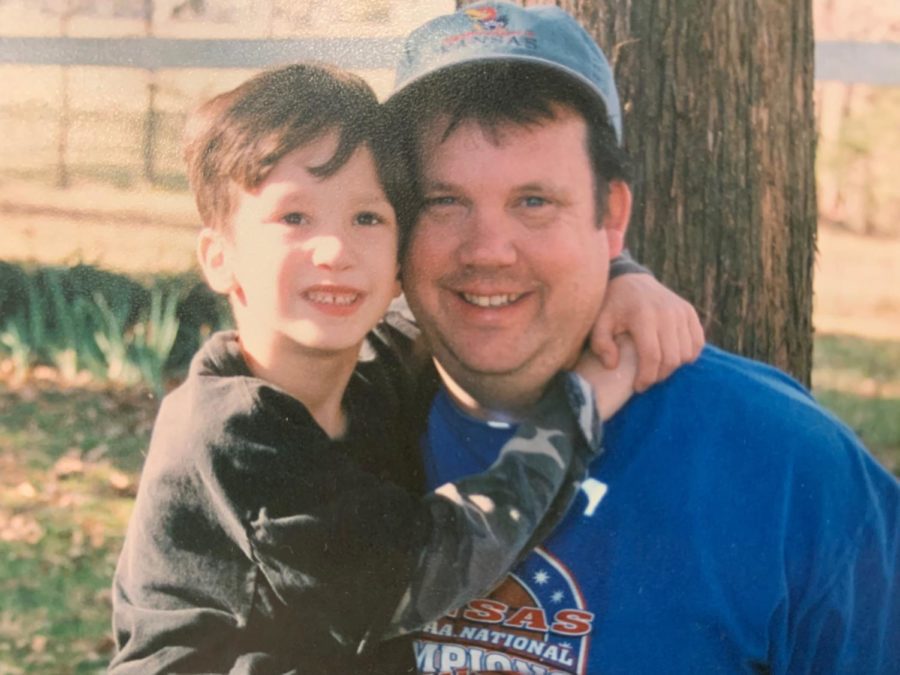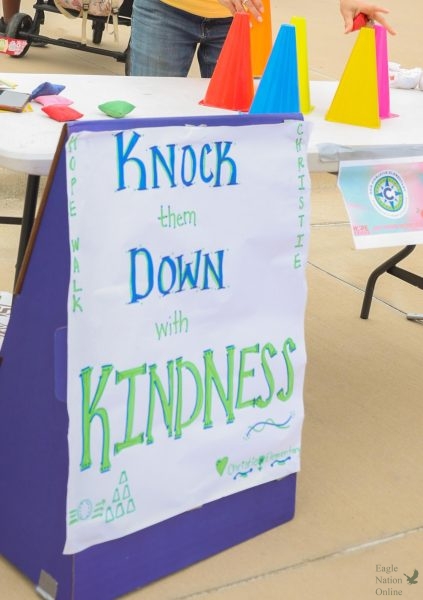Parent alienation leads to son’s death; now, dad speaks out
Government teacher Rodney McCall sits with his son. This picture hangs on the bulletin board in McCall’s classroom. “But mental health illness is very real,” McCall said. “And, I literally watched an extremely brilliant person become so consumed with hate that was caused by her mental illness, and addiction to prescription drugs.”
The day was supposed to end in victory for Rodney McCall, but instead, Oct. 21, 2011, ended in anguish. The “quiet, late-morning air” gave into the splitting sound of three gunshots. Karen Hayslett-McCall had shot 8-year-old Eryk twice, then turned the gun on herself, killing them both.
On Oct. 21, 2011, McCall received the news that he had been hoping to get: He was getting custody of his son, Eryk Hayslett-McCall. After what he said was a “long, difficult, and vicious divorce and custody battle,” McCall was given full guardianship of his son, while his ex-wife, Hayslett-McCall’s, parental rights were terminated.
Parent alienation led to the problem. Now, McCall often speaks about this topic with those who request his guidance. He’s attended meetings, conventions, and more to talk about himself and tell his story. Now, his story is being shared with students.
In McCall’s book, For the Love of Eryk: Surviving Divorce, Parental Alienation, and Life After, McCall offers advice to others who may not even realize they are victims of parent alienation.
“No one had to tell me what my soul already understood,” McCall said. “Eyrk was gone.”
After finally getting what he had been fighting for for so long, his son was dead, as a result of a divorce and parent alienation from Karen Hayslett-McCall.
“I didn’t get married with the idea that I would get divorced. That was not in the equation,” McCall said. “In Texas, it takes two people to get married, but only one to get divorced. She (Hayslett-McCall) wanted the divorce. She had moved on.”
Though the marriage started off with that picture-perfect “red front door,” McCall said he started to notice a change in his family after his child Eryk was born.
“We were very excited to have a child,” McCall said. “It was probably after the first year that she (Hayslett-McCall) started to withdraw a little more. She had horrible migraines.”
With their nights often ending in the emergency room, the differences in McCall’s wife had started to become visible to him.
“She (Hayslett-McCall) was taking all kinds of medication. We would go to the emergency room at 1 in the morning because the migraines were horrible,” McCall said. “Her addiction to medication fed into her mental health issues that as she got older began to manifest themselves.”
Though Hayslett-McCall’s mental health had seemingly “declined,” McCall said, he said he also believed that the marriage had “dissolved,” as well.
“I felt that if I had more money, that life would be better,” McCall said. “Well, I wonder if I had spent more time investing in relationships instead of making memories, maybe the marriage wouldn’t have dissolved.”
Though it’s been nearly eight years since Hayslett-McCall’s death, little “reminders” of her will often come up to McCall.
“There are times where I get mad at her (Hayslett-McCall),” McCall said. “Something that we thoroughly enjoyed together, something will come up and remind me of that, and I want to reach out to her and call her and say, ‘Hey! You remember?’ But I can’t do that.”
Though to McCall, mental health is “very real” and can ruin more than relationships, but a person’s personality, as well.
“I get upset, because of the person that she could’ve been.” McCall said. “But mental health illness is very real. And, I literally watched an extremely brilliant person become so consumed with hate that was caused by her mental illness, and addiction to prescription drugs.”
After the death of his son and ex-wife, there was still a place for comfort. McCall said he had the “love and support” of a close group of friends that were apart of the “Divorce Recovery Group” in the Dallas area.
“They (the Divorce Recovery Group) just rallied around and made sure that I wasn’t alone,” McCall said. “We did something all the time. A lot of it focused on laughter. They have been a cane for me to lean on, even to this day.”
Though from that cold October morning, McCall remains adamant that his son’s death has to stand for more.
“I felt from the very beginning that Eryk’s death has to stand for something,” McCall said. “Because otherwise, it was for nothing. And I can’t believe that God Almighty would have allowed that to happen for no reason.”
Though the “horrors” he had endured, McCall has a message for those struggling, specifically with parent alienation and relationships.
“Just because the world beats you down, doesn’t mean you have to stay down and quit. You can’t control what happens to you. You can only control how you respond to it,” McCall said. “That’s why I do what I do. I travel and visit and talk to anyone who will stand still for long enough, about the horrors of this (parental alienation). Because what happened to me, is happening again and again and again to other parents and children. It (parent alienation) happens all the time. And I have to do my part, to try and put a stop to it.”
Your donation will support the student journalists of Prosper High School. Your contribution will allow us to purchase equipment and cover our annual website hosting costs.

Honors & Awards:
NSPA Top 10 National Finalist – Writer/Portfolio of the Year
2021-2022 UIL State Headline Writing - 6th place
2021-2022 UIL Regional Headline Writing - 2nd place
2021-2022 UIL District Headline Writing - 1st place
2020-2021 UIL District Feature Writing 1st place, Headline Writing 2nd place
2020-2021 UIL Regionals Feature Writing 4th place, alternate to UIL State
18 Best of SNO publications
10 individual ILPC placements
3 Best in Texas Superior Ratings, 4 Excellent Ratings, 3 Honorable Mentions
2021 TAJE Fall Fiesta Superior Rating - Live Feature Writing
PHS Writer of the Year, 2020-2021
NSPA and TAJE Student Journalist National Honor Roll
Quill & Scroll International Honor Society member
National Honor Society member















Rod McCall • Jun 30, 2020 at 4:29 pm
Michele, thank you for your response. I am sorry for the slow reply as I was only today notified that you had posted anything. Given the brevity of the article, I was not able to provide the many different details that happened. I did, however, include them in my book title, For The Love of Eryk. There are a large number of ways that one parent can encourage a child to learn to hate their other parent. Some are small and some are not so small. It can take some time for them to occur. Much depends on the relationship of the child with the alienated parent and the intensity of the parent doing the alienating. In my case, it took a little bit as Eryk and I had a strong relationship, but his mother kept up a steady barrage of activities that the last time I saw my son, I couldn’t even get a fist bump goodbye. Yes, research has shown that there is a great deal of mental health issues at stake. My ex suffered from borderline personality disorder as well as narcissism. If you would like to learn more, I would be happy to visit with you. You can reach me at my school email, remccall@prosper-isd.net
Michele • Apr 19, 2020 at 7:57 am
Such a sad story and tremendous loss. I’m curious after reading this though, how Parental alienation contributes to this case. I don’t have all details but see evidence of addiction and mental health here.
Monica • Oct 22, 2019 at 9:40 pm
Parent alienation is a very real issue that many go through daily and children are often caught in the middle of their parents struggle. This article hits home for me as I am a child of divorce and witnessed a form of parent alienation between my parents. Thank you for telling Mr. McCall’s story and shedding some light on how mental illness can change a person very drastically when under stressful situations. My heart goes out to Mr. McCall on loss of his son. May he continue to share his story so it can help others going through similar situations.
Maria • Oct 22, 2019 at 8:24 pm
Thank you for sharing this and bringing to light the impact of actions we all witness way too often. I hope that this helps someone that may be experiencing this in their own life to make a change.
Andrew • Oct 20, 2019 at 6:41 am
I myself am going through parental alienation. After going through a divorce and seeing my kids every 2nd weekend and specific holidays etc. The time with my children started changing drastically and more frequent visits to the courts but to no avail, they (the courts) saw nothing wrong that my oldest daughter wanted nothing to do with me, not at fault of me but of the lies told by her mother about me. And now, my youngest daughter is experiencing the same poison not just from her mother but now from her older sister.
There is nothing I can do, but hope as people keep telling me, ” they will get older, they will realize the truth, they will see who the real monster is ”
So for now, I wait, hurt, totally consumed by the pain of not seeing, hearing, from my children.
I pray to God, that when the kids finally realize who the real monster is, that she doesn’t take them away from me.
Andrew
Nicole Rhodes • Oct 16, 2019 at 7:53 am
This is the kind of story you hope to never have to read but because it does happen and is happening to so many, I’m thankful that our sweet teacher had the courage to share his story! Hopefully, it will help so many others dealing with this before it’s too late! I bought his book and cried reading it! We love you Mr. McCall!!
Caleb Audia • Oct 15, 2019 at 9:30 pm
Very interesting and what a great story! So sad that things like this happen, and I hope that the positivity of these actions helps out many others!